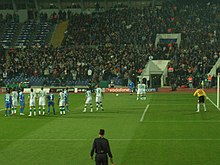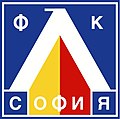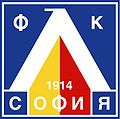Levski Sofia
| Levski Sofia | ||||
| Basic data | ||||
|---|---|---|---|---|
| Surname | PFK Levski Sofia | |||
| Seat | Sofia | |||
| founding | May 24, 1914 | |||
| president | Georgi Popov | |||
| Website | levski.bg | |||
| First soccer team | ||||
| Head coach | Petar Chubchev | |||
| Venue | Vivacom Arena - Georgi Asparukhov Stadium | |||
| Places | 29,200 | |||
| league | A group | |||
| 2019/20 | 4th Place | |||
|
|
||||
Levski Sofia (officially: PFK (Profesionalen futbolen klub) Lewski Sofia (ПФК Левски София), English transcription: Levski Sofia ) is a professional football club from Sofia , Bulgaria .
history
Foundation phase
The association was founded on May 24, 1914 by students from a university in Sofia under the name "ZS Levski Sofia". The name comes from Wassil Lewski , a Bulgarian freedom fighter during the Ottoman occupation. Initially the club colors were yellow and red. For a long time the club did not have its own venue and played its games and training sessions on military grounds.
In 1920 Levski changed the club's colors to the blue that is still used today. After renaming in the construction period to "Lewskiego Sofia", "Spartak Sofia" and "Sportista Sofia", the club won its first championship as "SK Lewski Sofia" in 1933 , with a 3-1 victory in the final against "Schipenski Sokol Varna" ( today: Spartak Varna ). The Vasil Levski Stadium was completed in the same year .
After Levski did not take part in the finals three times, Levski was able to win the championship again at the next attempt in 1937. In 1942, the trophy collection was expanded when the club won the trophy for the first time in addition to its third championship .
post war period
After the end of the Second World War , Levski began a very successful era, when the club won four championships between 1946 and 1950 in combination with the newly established Soviet Army Cup (only in 1948 the team remained untitled). During this time (1949) it was renamed “Dinamo Sofia” again.
In the 1950s, the shortly previously founded army sports club CSKA Sofia rose to become the dominant football club in Bulgaria. Levski was renamed Dinamo and could only win a single championship (in 1953). At the end of the decade, the club developed its later reputation as a cup team when the Soviet Army Cup was won again in 1956, 1957 and 1959, with a return to the old name in 1957 and thus the last two titles mentioned as "FD Levski Sofia" were won.
1960s and the European Cup
By winning the ninth championship in 1965 Levski qualified for the first time for the European Cup and was defeated there in the round of 16 by Benfica Lisbon . After winning the Soviet Army Cup in 1967 and 1968, Levski again reached the national championship competition by winning the championship in the same year. In the wake of the invasion of the Soviet troops in Czechoslovakia , Levski withdrew his participation in the cup together with some other Eastern European clubs after the UEFA committee had already drawn first-round matches "between East and West" repeated to avoid the political explosiveness Take out sports.
In 1969 Levski merged with " FD Spartak Sofia " and entered until 1985 under the name "DFS Levski-Spartak Sofia".
Comeback in the 1970s and 1980s
What was already indicated in the previous years by the title wins, developed in the following period, when the club managed to win seven championships, eight Soviet Army trophies and three editions of the Bulgarian cup, which was reintroduced for the 1980/1981 season, between 1970 and 1988 In 1984 even the triple was won.
In 1985 a dark chapter of the association followed. Shortly before the end of the season, Levski played the cup final against CSKA Sofia, which was extremely brutal on both sides and resulted in numerous red cards. The Bulgarian federation excluded both teams from the last match day, named third-placed Botev Plovdiv champions (this was reversed in 1990 and Levski subsequently received the title) and issued a number of personal punishments. The club dissolved at short notice and was re-established as "FK Witoscha Sofia".
Modern developments since the 1990s

After the club revived its old name as "FK Levski-13 Sofia" in 1990, after winning the cup in 1991 and 1992 it won its 18th championship in the following year and was defeated in the following season, again as "Levski-1913 Sofia" , in the round of 16 of the new UEFA Champions League against Werder Bremen and narrowly missed the group stage.
In addition to two cup wins in 1994 and 1998, Levski was only able to participate in the UEFA Cup after two championships in 1994 and 1995 as the Bulgarian title holder due to the low national coefficient in the UEFA five-year standings. In 1998 Levski adopted the name "PFK Lewski Sofia", which is still valid today.
Levski has been the most successful club in the country since 2000, currently with four championships, four cup wins and winning the Supercup in 2005. After beating Chievo (Italy) in qualifying, a Bulgarian team also took part for the first time in August 2006 at the Champions League. In the first game against Barcelona, however, they lost 5-0. The remaining games were also lost.
Sporting successes
- Bulgarian champion (26): 1933, 1937, 1942, 1946, 1947, 1949, 1950, 1953, 1965, 1968, 1970, 1974, 1977, 1979, 1984, 1985, 1988, 1993, 1994, 1995, 2000, 2001, 2002, 2006, 2007, 2009
- Bulgarian Cup Winner (13): 1942, 1982, 1984, 1986, 1991, 1992, 1994, 1998, 2000, 2002, 2003, 2005, 2007
- Soviet Army Cup Winners (16): 1946, 1947, 1949, 1950, 1956, 1957, 1959, 1967, 1970, 1971, 1976, 1977, 1979, 1984, 1987, 1988
- Bulgarian Supercup (3): 2005, 2007, 2009
Levski Sofia B
Levski Sofia B or Levski B is Levski Sofia's second team . In 2008 the Bulgarian Football Association founded a league for the reserve teams of the top clubs. So Levski Sofia B was founded in 2008. In Lewski's second team, mainly young players and talents play who are also used in the first team. In the second team, these players should be introduced to the first. However, all players who play in the first team are also allowed to play in the second. The trainer is currently Biser Hazday .
Stadion
Levski plays his league and cup games in the Vivacom Arena - Georgi Asparuchow Stadium . European Cup matches are played in the Vasil Levski National Stadium, as the Georgi Asparukhov Stadium does not comply with UEFA regulations.
pendant
Levski Sofia sometimes has to pay a fine for bad derailments by some of his supporters . A few Levski fans had z. For example, on April 20, during a league game, a banner with the words " Happy Birthday " and " He was right " rolled out and next to it the number 18, which stands for the initials of Adolf Hitler . In addition, the supporters showed swastika posters.
Former players
-
Stanislaw Angelow (2001-2007, defense)

- He came from local rivals CSKA Sofia and played over 200 league games for Levski. He also took part in the 2006/07 UEFA Champions League with Levski . The defender was three times champion and four times cup winner with Levski Sofia in Bulgaria. In 2007 he left Levski and moved to Germany.
-
Georgi Asparuchow † (1959–1961, 1963–1971, Sturm)

- "Gundi" scored an impressive 125 goals in 199 games for Levski Sofia. After scoring just 7 goals in 23 games in his first attempt at Levski, he played for Botew Plovdiv for two years before coming back to Sofia. Levski's home stadium, the Georgi Asparuchow Stadium, is named after him. The striker was three times A Grupa champion and four times Bulgarian Cup winner.
-
Daniel Borimirow (1990–1995, 2003–2008, midfielder)

- The 70-time Bulgarian international was five times Bulgarian champion and five times Bulgarian cup winner. He was also the best player in the Bulgarian A Grupa in 2005. The midfielder was also part of the 2006/07 UEFA Champions League squad.
-
Marian Christow (1995–1997, midfield)

- The midfielder played 56 league games for Levski and scored 19 goals. In 1997 the midfielder moved to Germany.
-
Valery Domowtschijski (2004-2008, Sturm)

- In 121 games for Levski, he scored an impressive 60 goals. He was considered a great talent at Levski and took part with the team in the 2006/07 UEFA Champions League. With Levski he was twice A Grupa champion and also won the Bulgarian Cup twice. In 2008, the striker Levski left for Germany.
-
Georgi Donkow (? -1993, storm)

- After he previously played at smaller clubs in Soifa, the Bulgarian moved to Levski.
-
Petar Hubchev (1989–1993, midfield)

- The midfielder has played 125 league games for Levski Sofia in four years. He was once Bulgarian champion and twice Bulgarian cup winner. In 1993 he left Levski and moved to Germany.
-
Nikolaj Iliew (1983–1989, 1992–1993, defense)

- The defense player, voted Bulgarian Footballer of the Year in 1987, played 196 A Grupa games for Levski, was four times champion in Bulgaria and won the Bulgarian Cup twice with Levski. Between his two seasons with Levski, he played in Italy and Germany. He later moved to France.
-
Dimitar Iwankow (1995-2005, goalkeeper)

- After he left the youth team of Levski Sofia in 1995, he completed 275 A Grupa games as a professional in 10 years and scored 25 goals. With the club he won the Bulgarian Cup five times and the A Grupa three times.
-
Georgi Ivanov (1997-2002, 2003-2004, 2006, 2008-2009, Sturm)

- "Gonzo" played four times for Levski Sofia, completed 204 A Grupa games and scored 122 goals, making him the player with the fourth most goals for Levski. The Bulgarian footballer in 2001 and 2002 was five times Bulgarian champion and four times cup winner with Levski. He was also the top scorer of the A Grupa in 2001. In between he played in France, Turkey and Croatia. After retiring in 2009, he moved to the management of Levski Sofia.
-
Slatko Jankow (1990–1992, 1992–1995, defense)

- The defender, who was also active in Germany, was twice Bulgarian champion and twice Bulgarian cup winner. He played over 100 games for Levski and was loaned to Spain once.
-
Péter Kabát (2002, storm)

- The Hungarian ex-national player was only at Levski Sofia for six months. Nevertheless, he won the Bulgarian League and the Cup with Levski in 2002. For Levski, he completed 15 league games and scored 5 goals in A Grupa.
-
Borislaw Michajlow (1981–1989, goalkeeper)

- The Bulgarian Footballer of the Year 1986 completed 180 A Grupa matches for Levski in eight seasons. He was three times champion and three times cup winner. In 1989 he moved from Levski to Portugal.
-
Nikolaj Michajlow (2004-2007, goalkeeper)

- The son of goalkeeper Borislaw Michajlow, who also played for Levski, played 44 games for Levski in the A Grupa in three years and took part in the Champions League with Sofia in the 2006/07 season. He also won the cup and the championship twice with Levski Sofia.
-
Njogu Demba-Nyrén (2003, storm)

- In 2003 he came to Levski Sofia for half a year. After a disappointing record (10 games 0 goals), the striker from Gambia was released again.
-
Gustavo Franchin Schiavolin (2001-2002, defense)

- In 2002 he became champion with Levski A Grupa.
-
Nasko Sirakow (1980, 1983–1988, 1991–1992, 1993–1994, Sturm)

- The striker has scored 206 goals in 258 A Grupa games for Levski and is the player with the most league goals for Levski Sofia. He won the A Grupa five times with Levski Sofia and the Bulgarian Cup four times. Between his four seasons with Levski, he played in Spain and France, among others.
-
Igor Tomašić (2005-2008, defense)

- The Croatian won two cups and two championships with Levski. After playing 130 league games for Levski and taking part in the 2006/07 UEFA Champions League, he left the club in 2008 and moved to Israel. With Levski, the defender was twice champion and twice won the cup in Bulgaria.
other former players
Nikolaj Michajlow took part in the 2006/07 season with Levski in the Champions League.
Hungarian striker Péter Kabát scored 5 goals in 15 games for Levski.
Valery Domowchijski scored an impressive 60 goals for Levski in 121 league games.
Former trainers

-
 Ivan Radoev
Ivan Radoev
-
 Dimitar Mutafchiev
Dimitar Mutafchiev
-
 Georgi Pachedziew
Georgi Pachedziew
-
 Rudolf Vytlačil
Rudolf Vytlačil
-
 Krasimir Khakarov
Krasimir Khakarov
-
 Yordan Arsow
Yordan Arsow
-
 Ivan Vutsow
Ivan Vutsow
-
 Dobromir Zhechew
Dobromir Zhechew
-
 Vasil Metodiev
Vasil Metodiev
-
 Kiril Ivkov
Kiril Ivkov
-
 Pavel Panov
Pavel Panov
-
 Georgi Vasilev
Georgi Vasilev
-
 Vyacheslav Grozny
Vyacheslav Grozny
-
 Vladimir Fedotov
Vladimir Fedotov
-
 Ljupko Petrovic
Ljupko Petrovic
-
 Dimitar Dimitrov
Dimitar Dimitrov
-
 Rüdiger Abramczik
Rüdiger Abramczik
-
 Slavoljub Muslin
Slavoljub Muslin
-
 Stanimir Stoilov
Stanimir Stoilov
-
 Emil Welew
Emil Welew
Club crest
The club coats of arms from 1914 to today:
Records
Most games
| # | Surname | Career | Games | Gates |
|---|---|---|---|---|
| 1 |
|
1967-1981 | 483 | 4th |
| 2 |
|
1974-1990 | 415 | 111 |
| 3 |
|
1969-1981 | 383 | 177 |
| 4th |
|
1967-1978 | 375 | 15th |
| 5 |
|
1956-1971 | 344 | 85 |
| 6th |
|
1996-2008 / 2009-2010 | 335 | 23 |
| 7th |
|
1954-1968 | 326 | 132 |
| 8th |
|
1953-1968 | 299 | 45 |
| 9 |
|
1977-1992 | 296 | 6th |
| 10 |
|
1971-1981 | 295 | 50 |
Most goals
| # | Surname | Career | Games | Gates | average |
|---|---|---|---|---|---|
| 1 |
|
1981-1994 | 258 | 206 | 0.80 |
| 2 |
|
1969-1981 | 383 | 177 | 0.46 |
| 3 |
|
1959-1971 | 238 | 153 | 0.64 |
| 4th |
|
1997-2007 | 197 | 116 | 0.59 |
| 6th |
|
1974-1990 | 415 | 111 | 0.27 |
| 7th |
|
1956-1965 | 207 | 104 | 0.50 |
| 8th |
|
1981-1987 | 169 | 102 | 0.60 |
| 9 |
|
1958-1969 | 237 | 83 | 0.35 |
| 10 |
|
1955-1960 1961-1971 |
281 | 65 | 0.23 |
Transfer records
Accesses
|
Departures
|
Derby balance sheet
Levski - CSKA :
121 games; 48 wins, 34 draws, 39 losses; 181: 168 goals
Levski - Slavia :
119 games; 56 wins, 40 draws, 23 losses; 202: 125 goals
Levski - Locomotive :
114 games; 67 wins, 26 draws, 21 defeats; 212: 104 goals
Bulgarian Footballer of the Year
Only players are listed who also played for Levski Sofia at the time.
- 1965 - Georgi Asparukhov
- 1970 - Stefan Aladschow
- 1974 - Kiril Ivkov
- 1975 - Kiril Ivkov
- 1977 - Pavel Panov
- 1984 - Plamen Nikolov
- 1986 - Borislav Michajlow
- 1999 - Alexandar Alexandrov
- 2000 - Georgi Ivanov
- 2001 - Georgi Ivanov
Others
- Levski has the largest national fan base (called: "Lewskari") and is seen as a "people's association", although this is also due to the conscious competition and differentiation from local rivals CSKA.
- Between 1966 and 1985 Levski remained unbeaten in 203 consecutive home games.
- Certainly the shortest term of office in the club's history was given by some of Levski supporters to their new coach Ivajlo Petev. During his inaugural press conference, fans suggested to him that it would be a good idea to take off his club badge track jacket as a first act and then leave the room immediately. Petev leaned over and stepped back the next day. Reason for the frosty reception: Petev is said to have sympathy for CSKA.
Web links
- Official homepage (Bulgarian, English)
- Levski Sofia - Statistics (Bulgarian)
- Levski.com - the old website
- Fan club















